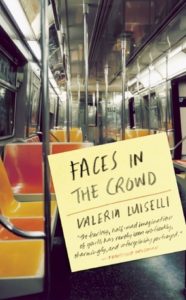 Title: The Neighborhood (Goodreads)
Title: The Neighborhood (Goodreads)
Author: Mario Vargas Llosa
Translator: Edith Grossman
Published: Farrar, Straus and Giroux, 2016
Pages: 256
Genres: Contemporary
My Copy: Paperback
Buy: Amazon, Book Depository, Wordery (or visit your local Indie bookstore)
I have been reading a lot of authors lately that I have been meaning to try for a long time, which leads me to pick up The Neighborhood by Mario Vargas Llosa. The novel follows two wealthy couples that find themselves embroiled in a salacious scandal, starting with a politically motivated blackmail that lead to photos being published in a gossip magazine. While the actions of one man, this scandal affects not only his own wife but also his lawyer and his wife.
Set in 1990s Lima, The Neighborhood explores the not only the effects of one person’s actions but also the seedy underbelly of Peruvian privilege. Most people are aware of my love for political turmoil in my literature, so this was a book I knew I would need to read. However it was not the political elements that ended up interesting me but the personal affects a scandal had on the people around him. While Enrique is navigating through the blackmail and threats of exposure, his wife is in the midst of a passionate love affair with his lawyer’s wife.
This brings me to the major problem with the novel, sex. I am beginning to wonder why male writers even attempt to write sex scenes because they far too often come across as cringe worthy. The lesbian affair was one of the most interesting aspects of the story but whenever Mario Vargas Llosa started writing about sex, the novel becomes unreadable. This is probably some of the worst sex scenes I have read, and I mean they are worse than people like Haruki Murakami and I think he has won the Bad Sex in Fiction award. (Note: Murakami has not won the award but has been nominated numerous times. Also it is interesting to note the ratio of Men to Women who have won the award; 22 to 2).
Mario Vargas Llosa has this great ability to demonstrate just what is going on in at the time politically. I wanted to learn more about the corruption and politics of 1990s Peru. I think he has a unique ability to blend the political landscape into a personal story. Exploring not just the effects of the country but how it personally affects an individual. Judging by the book, I could not tell you what political views has, but if I had to guess, I would say he was in the centre of the spectrum with a slight lean to the left.
There is so much to really enjoy about The Neighborhood, it is just a shame a vital part of the novel lets the entire book down. Rather than Vargas Llosa writing out his lustful fantasies about lesbians, he could have talked more about the world. Alberto Fujimori was the president at the times and there is a lot there that would be worth mentioning. I would rather explore that to descriptions of armpit licking. Mario Vargas Llosa won the Nobel Prize in Literature, “for his cartography of structures of power and his trenchant images of the individual’s resistance, revolt, and defeat.” To be fair, this was done to perfection. If there were not any sex scenes I would confidently pick up more Mario Vargas Llosa novels, but at the moment, I am too worried.

 Title: The Sound of Things Falling (
Title: The Sound of Things Falling ( Title: Faces in the Crowd (
Title: Faces in the Crowd ( Title: August (
Title: August ( Title: The Seven Madmen (
Title: The Seven Madmen ( Title: The Impostor (
Title: The Impostor ( Being able to reflect on my reading month is one of the reasons I do these wrap ups. It is surprising how much my perception on my month is different to the reality. Like last month, I thought I had a slow reading month, but completing eight books is amazing. I have been trying to slow down my reading to focus on the reading I am doing and I am sure I am doing just that. However, the fact that I finished so many books makes me thing otherwise. We have been housesitting for the past few months and this affected my reading drastically but in reality, not so much.
Being able to reflect on my reading month is one of the reasons I do these wrap ups. It is surprising how much my perception on my month is different to the reality. Like last month, I thought I had a slow reading month, but completing eight books is amazing. I have been trying to slow down my reading to focus on the reading I am doing and I am sure I am doing just that. However, the fact that I finished so many books makes me thing otherwise. We have been housesitting for the past few months and this affected my reading drastically but in reality, not so much.